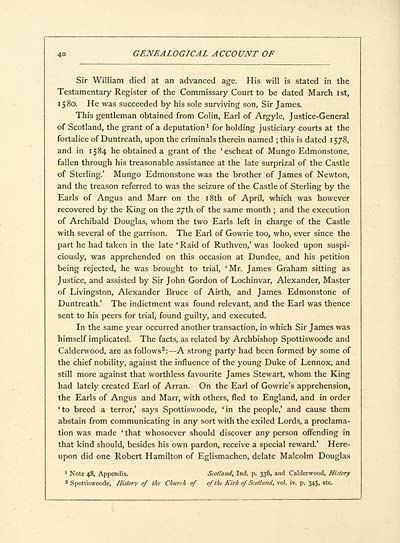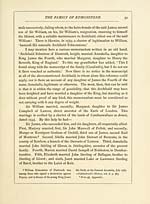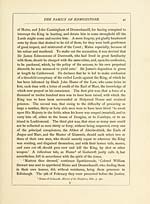Genealogical account of the family of Edmonstone of Duntreath
(58) Page 40 - Sir James Edmonstone --- 1580-1618
Download files
Complete book:
Individual page:
Thumbnail gallery: Grid view | List view

40 GENEALOGICAL ACCOUNT OF
Sir William died at an advanced age. His will is stated in the
Testamentary Register of the Commissary Court to be dated March ist,
1580. He was succeeded by his sole surviving son, Sir James.
This gentleman obtained from Colin, Earl of Argyle, Justice-General
of Scotland, the grant of a deputation 1 for holding justiciary courts at the
fortalice of Duntreath, upon the criminals therein named ; this is dated 1578,
and in 1584 he obtained a grant of the 'escheat of Mungo Edmonstone,
fallen through his treasonable assistance at the late surprizal of the Castle
of Sterling.' Mungo Edmonstone was the brother of James of Newton,
and the treason referred to was the seizure of the Castle of Sterling by the
Earls of Angus and Marr on the 18th of April, which was however
recovered by the King on the 27th of the same month ; and the execution
of Archibald Douglas, whom the two Earls left in charge of the Castle
with several of the garrison. The Earl of Gowrie too, who, ever since the
part he had taken in the late ' Raid of Ruthven,' was looked upon suspi-
ciously, was apprehended on this occasion at Dundee, and his petition
being rejected, he was brought to trial, ' Mr. James Graham sitting as
Justice, and assisted by Sir John Gordon of Lochinvar, Alexander, Master
of Livingston, Alexander Bruce of Airth, and James Edmonstone of
Duntreath.' The indictment was found relevant, and the Earl was thence
sent to his peers for trial, found guilty, and executed.
In the same year occurred another transaction, in which Sir James was
himself implicated. The facts, as related by Archbishop Spottiswoode and
Calderwood, are as follows 2 : — A strong party had been formed by some of
the chief nobility, against the influence of the young Duke of Lennox, and
still more against that worthless favourite James Stewart, whom the King
had lately created Earl of Arran. On the Earl of Gowrie's apprehension,
the Earls of Angus and Marr, with others, fled to England, and in order
' to breed a terror,' says Spottiswoode, ' in the people,' and cause them
abstain from communicating in any sort with the exiled Lords, a proclama-
tion was made 'that whosoever should discover any person offending in
that kind should, besides his own pardon, receive a special reward.' Here-
upon did one Robert Hamilton of Eglismachen, delate Malcolm Douglas
1 Note 48, Appendix. Scotland, Ind. p. 336, and Calderwood, History
2 Spottiswoode, History of the Church of of the Kirk of Scotland, vol. iv. p. 345, etc.
Sir William died at an advanced age. His will is stated in the
Testamentary Register of the Commissary Court to be dated March ist,
1580. He was succeeded by his sole surviving son, Sir James.
This gentleman obtained from Colin, Earl of Argyle, Justice-General
of Scotland, the grant of a deputation 1 for holding justiciary courts at the
fortalice of Duntreath, upon the criminals therein named ; this is dated 1578,
and in 1584 he obtained a grant of the 'escheat of Mungo Edmonstone,
fallen through his treasonable assistance at the late surprizal of the Castle
of Sterling.' Mungo Edmonstone was the brother of James of Newton,
and the treason referred to was the seizure of the Castle of Sterling by the
Earls of Angus and Marr on the 18th of April, which was however
recovered by the King on the 27th of the same month ; and the execution
of Archibald Douglas, whom the two Earls left in charge of the Castle
with several of the garrison. The Earl of Gowrie too, who, ever since the
part he had taken in the late ' Raid of Ruthven,' was looked upon suspi-
ciously, was apprehended on this occasion at Dundee, and his petition
being rejected, he was brought to trial, ' Mr. James Graham sitting as
Justice, and assisted by Sir John Gordon of Lochinvar, Alexander, Master
of Livingston, Alexander Bruce of Airth, and James Edmonstone of
Duntreath.' The indictment was found relevant, and the Earl was thence
sent to his peers for trial, found guilty, and executed.
In the same year occurred another transaction, in which Sir James was
himself implicated. The facts, as related by Archbishop Spottiswoode and
Calderwood, are as follows 2 : — A strong party had been formed by some of
the chief nobility, against the influence of the young Duke of Lennox, and
still more against that worthless favourite James Stewart, whom the King
had lately created Earl of Arran. On the Earl of Gowrie's apprehension,
the Earls of Angus and Marr, with others, fled to England, and in order
' to breed a terror,' says Spottiswoode, ' in the people,' and cause them
abstain from communicating in any sort with the exiled Lords, a proclama-
tion was made 'that whosoever should discover any person offending in
that kind should, besides his own pardon, receive a special reward.' Here-
upon did one Robert Hamilton of Eglismachen, delate Malcolm Douglas
1 Note 48, Appendix. Scotland, Ind. p. 336, and Calderwood, History
2 Spottiswoode, History of the Church of of the Kirk of Scotland, vol. iv. p. 345, etc.
Set display mode to:
![]() Universal Viewer |
Universal Viewer | ![]() Mirador |
Large image | Transcription
Mirador |
Large image | Transcription
Images and transcriptions on this page, including medium image downloads, may be used under the Creative Commons Attribution 4.0 International Licence unless otherwise stated. ![]()
| Histories of Scottish families > Genealogical account of the family of Edmonstone of Duntreath > (58) Page 40 - Sir James Edmonstone --- 1580-1618 |
|---|
| Permanent URL | https://digital.nls.uk/95354151 |
|---|---|
| Description | Married (1) Helen, daughter of James Stirling of Keir; (2) Margaret, daughter of Sir John Colquhoun of Luss. |
| Description | A selection of almost 400 printed items relating to the history of Scottish families, mostly dating from the 19th and early 20th centuries. Includes memoirs, genealogies and clan histories, with a few produced by emigrant families. The earliest family history goes back to AD 916. |
|---|

